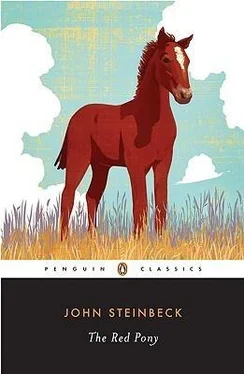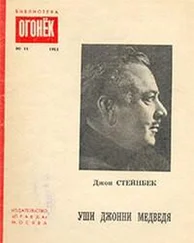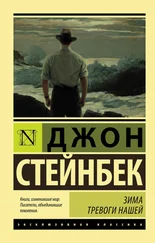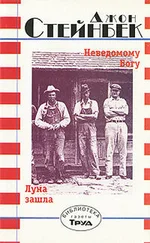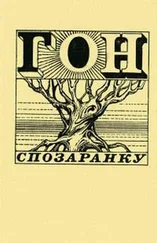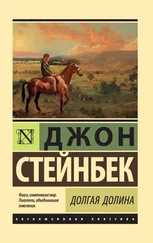“This country’s full of these old paisanos ,” Carl said to Billy Buck.
“They’re damn good men,” Billy defended them. “They can work older than white men. I saw one of them a hundred and five years old, and he could still ride a horse. You don’t see any white men as old as Gitano walking twenty or thirty miles.”
“Oh, they’re tough, all right,” Carl agreed. “Say, are you standing up for him too? Listen, Billy,” he explained, “I’m having a hard enough time keeping this ranch out of the Bank of Italy without taking on anybody else to feed. You know that, Billy.”
“Sure, I know,” said Billy. “If you was rich, it’d be different.”
“That’s right, and it isn’t like he didn’t have relatives to go to. A brother-in-law and cousins right in Monterey. Why should I worry about him?”
Jody sat quietly listening, and he seemed to hear Gitano’s gentle voice and its unanswerable, “But I was born here.” Gitano was mysterious like the mountains. There were ranges back as far as you could see, but behind the last range piled up against the sky there was a great unknown country. And Gitano was an old man, until you got to the dull dark eyes. And in behind them was some unknown thing. He didn’t ever say enough to let you guess what was inside, under the eyes. Jody felt himself irresistibly drawn toward the bunkhouse. He slipped from his chair while his father was talking and he went out the door without making a sound.
The night was very dark and far-off noises carried in clearly. The hamebells of a wood team sounded from way over the hill on the county road. Jody picked his way across the dark yard. He could see a light through the window of the little room of the bunkhouse. Because the night was secret he walked quietly up to the window and peered in. Gitano sat in the rocking-chair and his back was toward the window. His right arm moved slowly back and forth in front of him. Jody pushed the door open and walked in. Gitano jerked upright and seizing a piece of deerskin, he tried to throw it over the thing in his lap, but the skin slipped away. Jody stood overwhelmed by the thing in Gitano’s hand, a lean and lovely rapier with a golden basket hilt. The blade was like a thin ray of dark light. The hilt was pierced and intricately carved.
“What is it?” Jody demanded.
Gitano only looked at him with resentful eyes, and he picked up the fallen deerskin and firmly wrapped the beautiful blade in it.
Jody put out his hand. “Can’t I see it?”
Gitano’s eyes smoldered angrily and he shook his head.
“Where’d you get it? Where’d it come from?”
Now Gitano regarded him profoundly, as though he pondered. “I got it from my father.”
“Well, where’d he get it?”
Gitano looked down at the long deerskin parcel in his hand. “I don’t know.”
“Didn’t he ever tell you?”
“No.”
“What do you do with it?”
Gitano looked slightly surprised. “Nothing. I just keep it.”
“Can’t I see it again?”
The old man slowly unwrapped the shining blade and let the lamplight slip along it for a moment. Then he wrapped it up again. “You go now. I want to go to bed.” He blew out the lamp almost before Jody had closed the door.
As he went back toward the house, Jody knew one thing more sharply than he had ever known anything. He must never tell anyone about the rapier. It would be a dreadful thing to tell anyone about it, for it would destroy some fragile structure of truth. It was a truth that might be shattered by division.
On the way across the dark yard Jody passed Billy Buck. “They’re wondering where you are,” Billy said.
Jody slipped into the living-room, and his father turned to him. “Where have you been?”
“I just went out to see if I caught any rats in my new trap.”
“It’s time you went to bed,” his father said.
Jody was first at the breakfast table in the morning. Then his father came in, and last, Billy Buck. Mrs. Tiflin looked in from the kitchen.
“Where’s the old man, Billy?” she asked.
“I guess he’s out walking,” Billy said. “I looked in his room and he wasn’t there.”
“Maybe he started early to Monterey,” said Carl. “It’s a long walk.”
“No,” Billy explained. “His sack is in the little room.”
After breakfast Jody walked down to the bunkhouse. Flies were flashing about in the sunshine. The ranch seemed especially quiet this morning. When he was sure no one was watching him, Jody went into the little room, and looked into Gitano’s sack. An extra pair of long cotton underwear was there, an extra pair of jeans and three pairs of worn socks. Nothing else was in the sack. A sharp loneliness fell on Jody. He walked slowly back toward the house. His father stood on the porch talking to Mrs. Tiflin.
“I guess old Easter’s dead at last,” he said. “I didn’t see him come down to water with the other horses.”
In the middle of the morning Jess Taylor from the ridge ranch rode down.
“You didn’t sell that old gray crowbait of yours, did you, Carl?”
“No, of course not. Why?”
“Well,” Jess said. “I was out this morning early, and I saw a funny thing. I saw an old man on an old horse, no saddle, only a piece of rope for a bridle. He wasn’t on the road at all. He was cutting up straight through the brush. I think he had a gun. At least I saw something in his hand.”
“That’s old Gitano,” Carl Tiflin said. “I’ll see if any of my guns are missing.” He stepped into the house for a second. “Nope, all here. Which way was he heading, Jess?”
“Well, that’s the funny thing. He was heading straight back into the mountains.”
Carl laughed. “They never get too old to steal,” he said. “I guess he just stole old Easter.”
“Want to go after him, Carl?”
“Hell no, just save me burying that horse. I wonder where he got the gun. I wonder what he wants back there.”
Jody walked up through the vegetable patch, toward the brush line. He looked searchingly at the towering mountains—ridge after ridge after ridge until at last there was the ocean. For a moment he thought he could see a black speck crawling up the farthest ridge. Jody thought of the rapier and of Gitano. And he thought of the great mountains. A longing caressed him, and it was so sharp that he wanted to cry to get it out of his breast. He lay down in the green grass near the round tub at the brush line. He covered his eyes with his crossed arms and lay there a long time, and he was full of a nameless sorrow.
In a mid-afternoon of spring, the little boy Jody walked martially along the brush-lined road toward his home ranch. Banging his knee against the golden lard bucket he used for school lunch, he contrived a good bass drum, while his tongue fluttered sharply against his teeth to fill in snare drums and occasional trumpets. Some time back the other members of the squad that walked so smartly from the school had turned into the various little canyons and taken the wagon roads to their own home ranches. Now Jody marched seemingly alone, with high-lifted knees and pounding feet; but behind him there was a phantom army with great flags and swords, silent but deadly.
The afternoon was green and gold with spring. Underneath the spread branches of the oaks the plants grew pale and tall, and on the hills the feed was smooth and thick. The sagebrushes shone with new silver leaves and the oaks wore hoods of golden green. Over the hills there hung such a green odor that the horses on the flats galloped madly, and then stopped, wondering; lambs, and even old sheep, jumped in the air unexpectedly and landed on stiff legs, and went on eating; young clumsy calves butted their heads together and drew back and butted again.
Читать дальше
